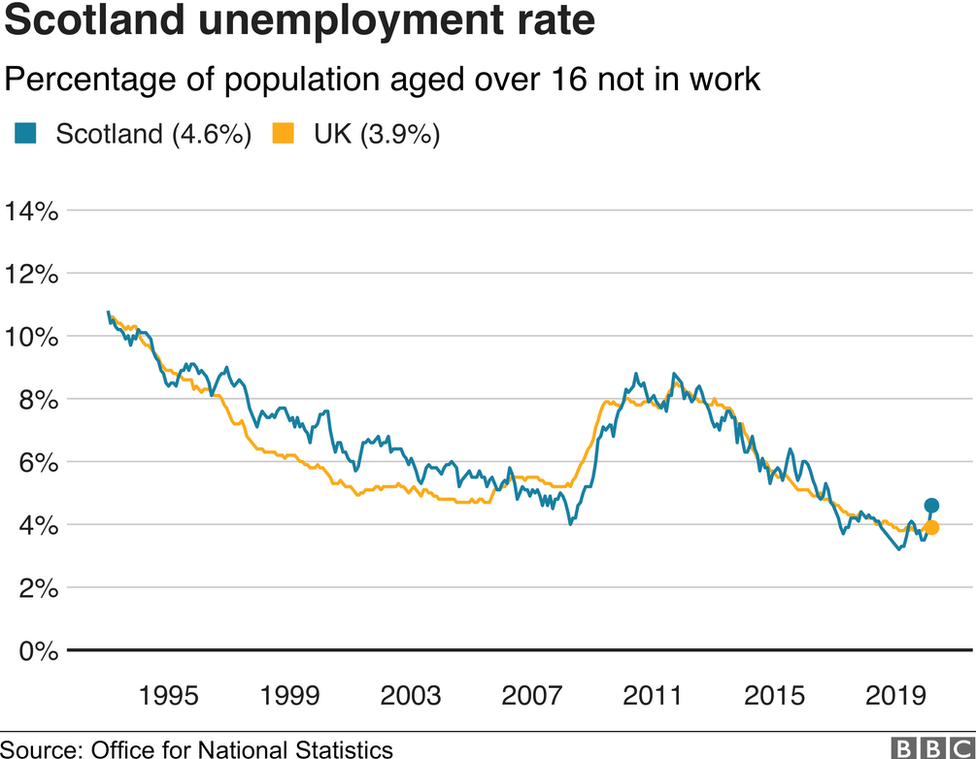Coronavirus: Call for new jobs 'guarantee' for young Scots
- Published
- comments

A group advising Scottish ministers on how to repair the economic crisis caused by coronavirus has called for a jobs guarantee for 16 to 25-year-olds.
The panel led by former Tesco Bank boss Benny Higgins has published a list of recommendations for economic recovery.
They called for a nation-wide scheme to offer at least two years of "secure employment" to young people, to avoid "long-term scarring" of a generation.
Mr Higgins said Scotland must "create jobs at an unprecedented rate".
The report also calls for a "significant increase" in infrastructure investment, particular in digital technologies, and targeted measures to support the hospitality and tourism industries.
The Scottish government said it would "develop a detailed response to the report which will be published before the end of July".
First Minister Nicola Sturgeon said the jobs guarantee proposal was "potentially very significant as we seek to ensure young people get the opportunities they deserve".
And she said the government would "look positively" at whether it could help stop firms going bust by taking a stake in individual companies.
The independent report - which was commissioned by ministers in April - estimates that Scottish GDP could fall by 33% over the months where social distancing restrictions are in place.
It says there is a "growing recognition that a quick rebound in economic activity following the phasing out of lockdown may be unlikely", echoing a warning from Scotland's chief economist that output may not recover to pre-crisis levels until 2023.
It says the virus has caused a "sharp reduction in supply and demand", with a "disproportionate impact" on sectors like hospitality, tourism and travel and a "severe impact on employment, especially for low-skill, low-paid" workers.
And it adds that Brexit could pose a "significant additional downside risk to the trajectory of economic recovery", with no sign of the UK extending the current transition period past the end of December.

In the foreword to the report, Mr Higgins said Scotland needs to "create jobs at an unprecedented rate", saying "we must take specific care to shelter those currently in their mid-teens through to those in their mid twenties".
He said: "We know well from previous recessions that there is a material risk of long-term scarring for this cohort of young people. They do not deserve it. We must act now to mitigate this risk."
The advisors said ministers, businesses and local authorities should "mobilise urgently" to set up a "Scottish Jobs Guarantee" scheme, saying: "The damage done to the generation currently aged 16-25 and their job prospects will be scar across their working lives if there is no urgent, ambitious and focused intervention to address it".
This would offer "secure employment, for a period of at least two years, to 16-25 year olds, paid at the living wage and with access to training and the possibility of progression".
It would be led primarily by local businesses, but within a "coherent national framework" set up by the Scottish government and with "targeted funding support" to assist firms.

The report said digital infrastructure will be "a critical factor" in economic recovery
The report also said that "plans for recovery need to recognise that some sectors will recover at a slower pace than others, depending on how restrictions are eased and how quickly travel resumes".
And the advisors said "improving digital infrastructure will be a critical factor in improving the prospects for recovery", calling for a "significant increase" in investment.
They also said the Scottish government should move to save important companies from collapse by buying stakes in them - something Ms Sturgeon said she was "open minded" about.
"We will look positively at whether government intervention, including taking stakes in companies, can help keep productive companies that have a future beyond this crisis from going bust and keeping them in operation," she said.
The first minister said her government had already taken an "interventionist approach" with firms like BiFab and Prestwick Airport, but that she was "duty bound" by constraints like getting value for money for the taxpayer.
Other recommendations include:
Bringing forward the review of the fiscal framework which underpins Holyrood's finances to unlock extra borrowing
Putting extra responsibility on banks for the survival of firms they lend to
A drive to attract more foreign firms to invest in Scotland
Targeted reductions in business rates for tourism and hospitality industries
Extra public and private investment in the creative sector and the establishment of a National Arts Force
Mr Higgins said: "If the monumental scale and nature of this economic shock is not a catalyst to accelerate change and to find new bold, radical interventions that will transform Scotland's economy, then nothing ever will be.
"We must be willing to revisit old demarcation lines without bias, and to discover new methods and levels of collaboration as we navigate our path of rehabilitation, recovery, and re-imagination."

The independent advisory group was led by former Tesco Bank chief executive Benny Higgins
Scottish Economy Secretary Fiona Hyslop thanked Mr Higgins and the independent advisory group for their work, saying: "Scotland, as with other countries, faces enormous challenges, and we need to all work together as never before to ensure our country emerges through this pandemic with a green economic recovery that has inclusion and wellbeing at its heart.
"We wanted the report to be ambitious and far-reaching, and with this strong and comprehensive set of recommendations this has certainly been achieved.
"The report identifies the importance of employment, the environment, education and equality. I agree that each one of these will be vital as we seek to create a society that is resilient, fair, and one in which everyone has the opportunity to be successful."
Scottish Labour leader Richard Leonard backed the idea of a jobs guarantee scheme, saying the government "must waste no more time" in setting one up.
While other parties also welcomed the report, the Scottish Greens said there was "little urgency on show" and the Lib Dems said there was a "disappointing lack of ambition" in some areas.
And Scottish Conservative economy spokesman Maurice Golden said that "all businesses are getting is far-off promises, which will be far too late for many".